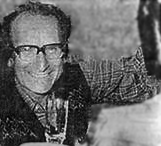César Milstein
César Milstein (8 October 1927 – 24 March 2002) was an Argentine biochemist in the field of immunology. He is best known for his pioneering work on monoclonal antibodies, for which he shared the Nobel Prize in Physiology or Medicine in 1984 with Georges Köhler and Niels K. Jerne. Milstein's contributions have had a profound impact on both scientific research and medical diagnostics.
Early Life and Education[edit | edit source]
César Milstein was born in Bahía Blanca, Argentina, to a Ukrainian-Jewish immigrant family. He developed an interest in biochemistry during his undergraduate studies at the University of Buenos Aires, where he received his degree in 1952. Milstein then went on to earn his Ph.D. in 1957 from the same institution, focusing on the enzyme kinetics of alkaline phosphatase.
Career and Research[edit | edit source]
After completing his Ph.D., Milstein traveled to the University of Cambridge in the United Kingdom to work under Malcolm Dixon on the mechanism of metal activation of enzyme reactions. In 1963, he returned to Argentina to establish a research group at the National Institute of Microbiology in Buenos Aires. However, due to political unrest in Argentina in the late 1960s, Milstein left his home country and returned to Cambridge, where he joined the Medical Research Council (MRC) Laboratory of Molecular Biology.
It was at the MRC Laboratory that Milstein, in collaboration with Georges Köhler, developed the hybridoma technique for the production of monoclonal antibodies in 1975. This groundbreaking work allowed for the production of antibodies that were both specific to a single antigen and could be produced in unlimited quantities. The implications of this discovery were vast, opening new avenues for research in immunology, as well as practical applications in medical diagnostics, therapeutics, and in the development of vaccines.
Nobel Prize[edit | edit source]
In 1984, César Milstein, along with Georges Köhler and Niels K. Jerne, was awarded the Nobel Prize in Physiology or Medicine "for theories concerning the specificity in development and control of the immune system and the discovery of the principle for production of monoclonal antibodies."
Later Life and Legacy[edit | edit source]
Milstein continued his work at the MRC Laboratory of Molecular Biology until his retirement. He remained active in the scientific community, advocating for the free distribution of monoclonal antibodies to researchers and was involved in numerous scientific advisory boards and committees. Milstein passed away on 24 March 2002 in Cambridge, England.
His legacy is carried on through the continued use and development of monoclonal antibodies in a wide range of scientific and medical fields. The technique he co-developed has led to significant advancements in the diagnosis and treatment of diseases, including cancer, autoimmune diseases, and infectious diseases.
Awards and Honors[edit | edit source]
In addition to the Nobel Prize, Milstein received numerous awards and honors throughout his career, including the Copley Medal and the Royal Medal from the Royal Society, of which he was a member. His work has left an indelible mark on the field of immunology and biotechnology.
See Also[edit | edit source]
Search WikiMD
Ad.Tired of being Overweight? Try W8MD's physician weight loss program.
Semaglutide (Ozempic / Wegovy and Tirzepatide (Mounjaro / Zepbound) available.
Advertise on WikiMD
|
WikiMD's Wellness Encyclopedia |
| Let Food Be Thy Medicine Medicine Thy Food - Hippocrates |
Translate this page: - East Asian
中文,
日本,
한국어,
South Asian
हिन्दी,
தமிழ்,
తెలుగు,
Urdu,
ಕನ್ನಡ,
Southeast Asian
Indonesian,
Vietnamese,
Thai,
မြန်မာဘာသာ,
বাংলা
European
español,
Deutsch,
français,
Greek,
português do Brasil,
polski,
română,
русский,
Nederlands,
norsk,
svenska,
suomi,
Italian
Middle Eastern & African
عربى,
Turkish,
Persian,
Hebrew,
Afrikaans,
isiZulu,
Kiswahili,
Other
Bulgarian,
Hungarian,
Czech,
Swedish,
മലയാളം,
मराठी,
ਪੰਜਾਬੀ,
ગુજરાતી,
Portuguese,
Ukrainian
Medical Disclaimer: WikiMD is not a substitute for professional medical advice. The information on WikiMD is provided as an information resource only, may be incorrect, outdated or misleading, and is not to be used or relied on for any diagnostic or treatment purposes. Please consult your health care provider before making any healthcare decisions or for guidance about a specific medical condition. WikiMD expressly disclaims responsibility, and shall have no liability, for any damages, loss, injury, or liability whatsoever suffered as a result of your reliance on the information contained in this site. By visiting this site you agree to the foregoing terms and conditions, which may from time to time be changed or supplemented by WikiMD. If you do not agree to the foregoing terms and conditions, you should not enter or use this site. See full disclaimer.
Credits:Most images are courtesy of Wikimedia commons, and templates, categories Wikipedia, licensed under CC BY SA or similar.
Contributors: Prab R. Tumpati, MD

